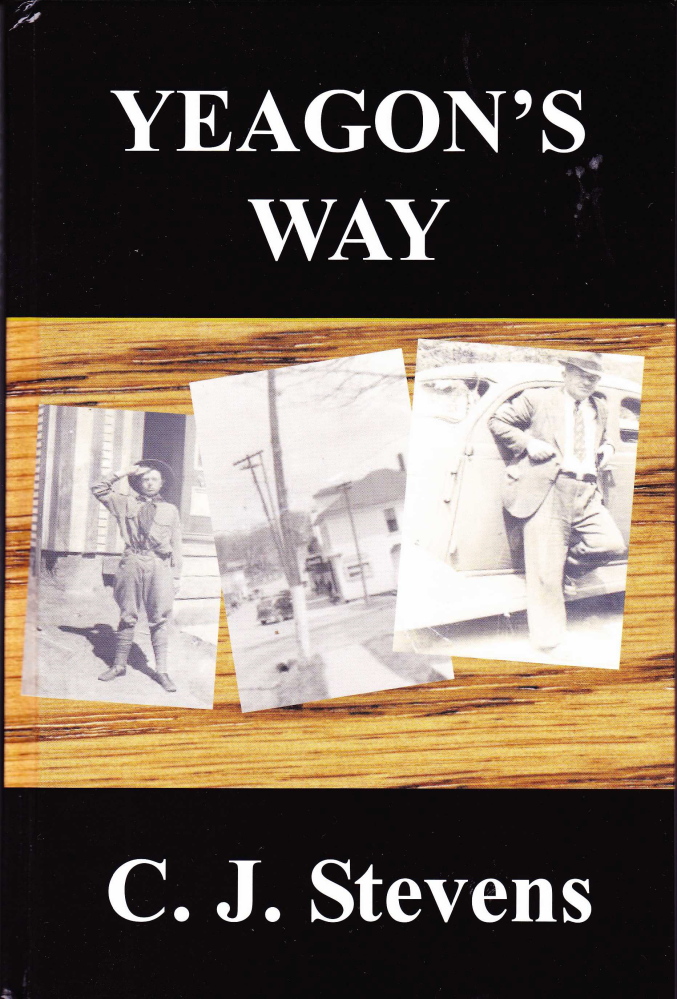Yeagon’s Way
By C.J. Stevens
John Wade, Publisher, Augusta, 2014
200 pages, hardcover, $20
C.J. Stevens’ newest book, “Yeagon’s Way,” is a collection of interrelated short stories about the residents of some closely knit fictional Maine towns in the first half of the 20th century. If I read the author’s perspective on this whole thing right, it was a sort of innocent, happy-go-lucky and painful time, and I can think of a couple of other works that corroborate the notion.
The book’s opening story, “The Sick Child,” introduces us to the fictional setting by taking us through the stages of young Malcolm Hamwit’s touch-and-go bout with pneumonia. We get the course of his illness in gory detail, with coughing, phlegm, sore throat, confinement to bed and family squabbles about the precise nature of the illness. This opens the way for a veritable catalog of the various treatments available and preferred in the time, from smelly onion plasters and camphor rubs to wishful recollections by some family members of Dr. Rowland’s System Builder and Lung Restorer. The great point of conflict is whether to bring from out of town Dr. Amos, the modern-day country physician whose newfangled methods in years past failed to work on another gravely ill family member.
The story makes a nice introduction to the collection because it places us in the detailed midst of C.J. Stevens’ sense of what it felt like to live in Maine during the great cultural and social transitions between the two world wars. The older people are skeptical of the modern, and the younger have a sort of restlessness unknown before the possibility of eventful, potentially fatal, family day trips by car to Bar Harbor.
The most vivid example is the title character from the title story, young schoolmaster Russell Yeagon. He’s a hopeless literary romantic full of quirky innovations in his one-room schoolhouse — including his romance with a local girl — to which the kids learn pertly to adapt.
These stories come from a world without television, meaning a decade or two before my own time, but I can tell you that the spirit of life in 1930s “Shiretown” (no connection to Houlton, as far as I can tell) is similar to that depicted in other books about midcentury Maine. The closest in overall atmosphere within my radarscope are the worlds of Ruth Moore’s fishing communities; “When Soft Was the Sun” a 2003 Puckerbrush Press novel by Merle Hillman; and Tom Lyford’s recollections of his Dover-Foxcroft boyhood in the 1950s — especially “Playing with Fire” (2011).
They all convey a sort of restless rural innocence in the face of cultural change, all shot with literary allusion. In fact, among the peppering of references to literary works, explicit mention of Edgar Lee Masters’ “Spoon River Anthology” suggests “Yeagon’s Way” might have been intended as a prose reply from Maine, a century later. That might be the best clue to the book’s essential frame of reference.
The stories in “Yeagon’s Way,” once you get used to the prose, could really evoke a blast from the past for some readers. C.J. Stevens, a Maine native, is quietly a prolific writer whose books include biographies of D.H. Lawrence and Erskine Caldwell, two other books of fiction, historical works and at least six volumes of poetry, among dozens of others. “Yeagon’s Way” is available by emailing wadecjs@yahoo.com, going to amazon.com, or writing to John Wade, Publisher, 17 Kendall St., Augusta 04330.
Contact Dana Wilde at universe@dwildepress.net with news of Maine books
and literary events.
Send questions/comments to the editors.


